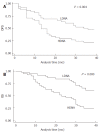Circulating DNA level is negatively associated with the long-term survival of hepatocellular carcinoma patients
- PMID: 16804981
- PMCID: PMC4087944
- DOI: 10.3748/wjg.v12.i24.3911
Circulating DNA level is negatively associated with the long-term survival of hepatocellular carcinoma patients
Abstract
Aim: To quantify the circulating DNA in plasma from patients with hepatocellular carcinoma (HCC) and to evaluate its prognostic value.
Methods: Blood samples were collected from 79 patients with HCC before operation, 20 patients with liver cirrhosis, and 20 healthy volunteers. Circulating DNA was extracted from plasma and quantified. The association between circulating DNA level and prognosis of HCC patients was evaluated.
Results: Compared with the healthy volunteers (17.6 +/- 9.5 ng/mL), a significant higher circulating DNA level was found in the patients with HCC (47.1 +/- 43.7 ng/mL, P = 0.000) or with liver cirrhosis (30.0 +/- 13.3 ng/mL, P = 0.002). The circulating DNA level was closely associated with tumor size (P = 0.008) and TNM stage (P = 0.040), negatively associated with the 3-year disease-free survival (DFS) (P = 0.017) and overall survival (OS) (P = 0.001).
Conclusion: Large or invasive tumor may release more circulating DNA, and higher level of circulating DNA may be associated with poor prognosis of HCC patients.
Figures
Similar articles
-
High preoparative levels of serum periostin are associated with poor prognosis in patients with hepatocellular carcinoma after hepatectomy.Eur J Surg Oncol. 2013 Oct;39(10):1129-35. doi: 10.1016/j.ejso.2013.06.023. Epub 2013 Jul 31. Eur J Surg Oncol. 2013. PMID: 23916473
-
Circulating tumor DNA profiling reveals clonal evolution and real-time disease progression in advanced hepatocellular carcinoma.Int J Cancer. 2017 Sep 1;141(5):977-985. doi: 10.1002/ijc.30798. Epub 2017 Jun 7. Int J Cancer. 2017. PMID: 28543104
-
Clinical significance of alpha-fetoprotein mRNA in blood of patients with hepatocellular carcinoma.Clin Chim Acta. 2004 Sep;347(1-2):129-38. doi: 10.1016/j.cccn.2004.04.032. Clin Chim Acta. 2004. PMID: 15313150 Clinical Trial.
-
Comparison of five models for end-stage liver disease in predicting the survival rate of patients with advanced hepatocellular carcinoma.Tumour Biol. 2016 Apr;37(4):5265-73. doi: 10.1007/s13277-015-4366-2. Epub 2015 Nov 11. Tumour Biol. 2016. PMID: 26561464
-
Prognostic significance of preoperative aspartate aminotransferase to neutrophil ratio index in patients with hepatocellular carcinoma after hepatic resection.Oncotarget. 2016 Nov 1;7(44):72276-72289. doi: 10.18632/oncotarget.10848. Oncotarget. 2016. PMID: 27472390 Free PMC article.
Cited by
-
Non-Invasive Detection of Esophageal Cancer using Genetic Changes in Circulating Cell-Free DNA.Avicenna J Med Biotechnol. 2012 Jan;4(1):3-13. Avicenna J Med Biotechnol. 2012. PMID: 23407878 Free PMC article.
-
Methylation profiling of serum DNA from hepatocellular carcinoma patients using an Infinium Human Methylation 450 BeadChip.Hepatol Int. 2013 Jul;7(3):893-900. doi: 10.1007/s12072-013-9437-0. Epub 2013 Sep 3. Hepatol Int. 2013. PMID: 26201927
-
Circulating-Free DNA Analysis in Hepatocellular Carcinoma: A Promising Strategy to Improve Patients' Management and Therapy Outcomes.Int J Mol Sci. 2019 Nov 5;20(21):5498. doi: 10.3390/ijms20215498. Int J Mol Sci. 2019. PMID: 31694149 Free PMC article. Review.
-
Cell-Free DNA: Hope and Potential Application in Cancer.Front Cell Dev Biol. 2021 Feb 22;9:639233. doi: 10.3389/fcell.2021.639233. eCollection 2021. Front Cell Dev Biol. 2021. PMID: 33693004 Free PMC article. Review.
-
Leveraging Blood-Based Diagnostics to Predict Tumor Biology and Extend the Application and Personalization of Radiotherapy in Liver Cancers.Int J Mol Sci. 2022 Feb 9;23(4):1926. doi: 10.3390/ijms23041926. Int J Mol Sci. 2022. PMID: 35216045 Free PMC article. Review.
References
-
- Pisani P, Parkin DM, Bray F, Ferlay J. Erratum: Estimates of the worldwide mortality from 25 cancers in 1990. Int. J. Cancer, 83, 18-29 (1999) Int J Cancer. 1999;83:870–873. - PubMed
-
- Greenlee RT, Hill-Harmon MB, Murray T, Thun M. Cancer statistics, 2001. CA Cancer J Clin. 2001;51:15–36. - PubMed
-
- Yuki K, Hirohashi S, Sakamoto M, Kanai T, Shimosato Y. Growth and spread of hepatocellular carcinoma. A review of 240 consecutive autopsy cases. Cancer. 1990;66:2174–2179. - PubMed
-
- Genda T, Sakamoto M, Ichida T, Asakura H, Kojiro M, Narumiya S, Hirohashi S. Cell motility mediated by rho and Rho-associated protein kinase plays a critical role in intrahepatic metastasis of human hepatocellular carcinoma. Hepatology. 1999;30:1027–1036. - PubMed
Publication types
MeSH terms
Substances
LinkOut - more resources
Full Text Sources
Other Literature Sources
Medical


